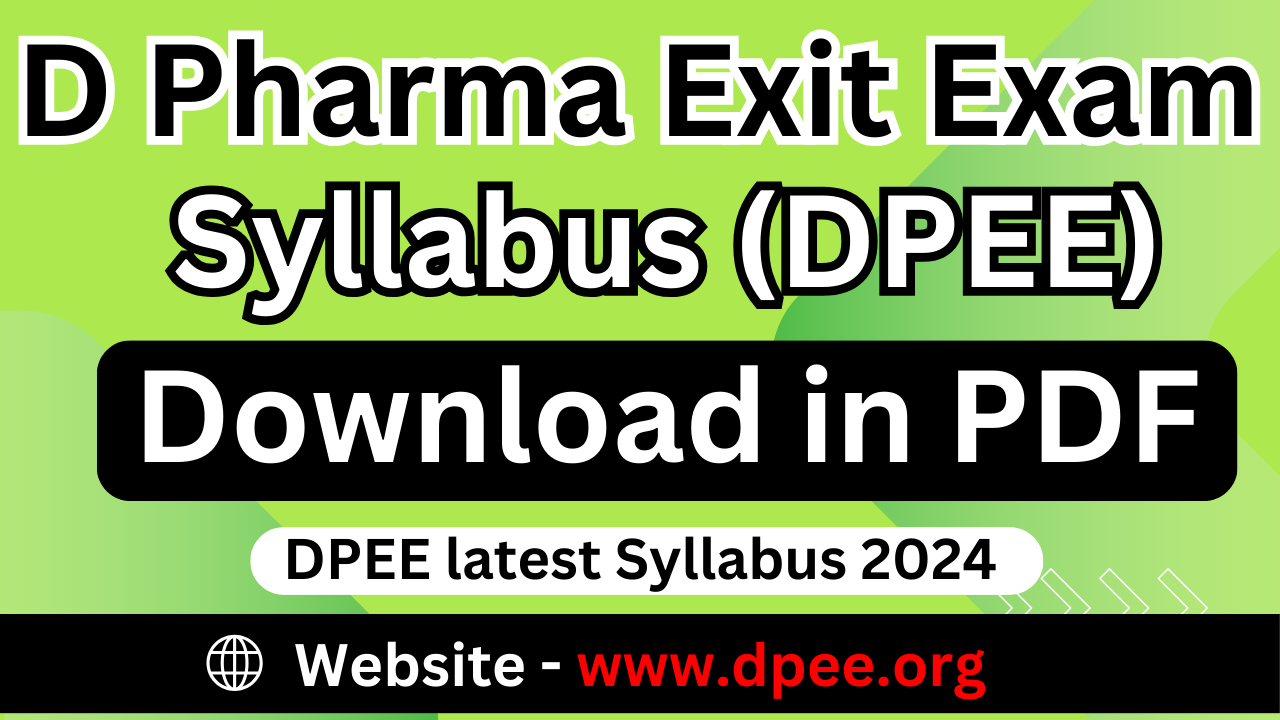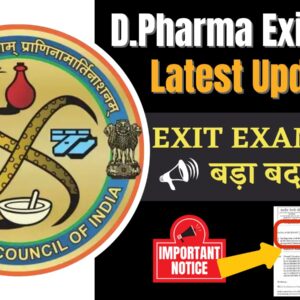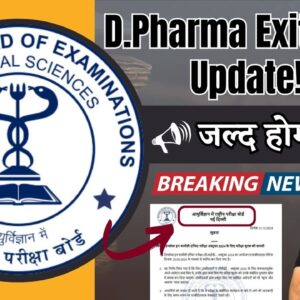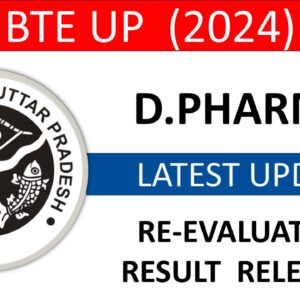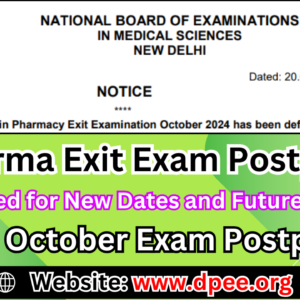D Pharma Exit Exam Syllabus 2024
The D Pharma Exit Exam (DPEE) is a crucial step for diploma holders in Pharmacy, determining their readiness to step into professional roles in the pharmaceutical industry. As mandated by the Pharmacy Council of India (PCI) under the Education Regulations 2020 (ER 2020), the syllabus for the DPEE 2024 encompasses a broad spectrum of subjects designed to assess the knowledge and skills acquired during the diploma course. Below is a detailed breakdown of the syllabus for the DPEE 2024, covering all the essential topics and knowledge areas that candidates need to master.
Click here to download DPEE Syllabus 2024 in PDF
1. PHARMACEUTICS
History and Evolution:
Understanding the history of pharmacy in India is fundamental. This includes the evolution of pharmacy education, the growth of the pharmaceutical industry, and the development of pharmacy practice. The role of various professional associations in shaping the profession is also covered.
Pharmaceutical Aids and Preservatives:
Candidates must be familiar with various packaging materials, pharmaceutical aids, and preservatives used in drug formulation. This section also covers the fundamentals of pharmacopoeias, which are authoritative guides on drug standards.
Unit Operations:
Key unit operations such as size reduction, size separation, mixing, filtration, drying, and extraction are crucial in drug manufacturing. Understanding these processes is vital for ensuring the quality and efficacy of pharmaceutical products.
Formulation Types:
A wide range of dosage forms is covered, including tablets, capsules, liquid oral preparations, topical preparations, nasal and ear preparations, powders, granules, sterile formulations, and immunological products. Knowledge of their preparation, packaging, and quality control is essential.
Manufacturing Plant Layout:
The syllabus includes the basic structure and layout of pharmaceutical manufacturing plants, emphasizing the importance of quality control, quality assurance, and current good manufacturing practices (cGMP). Candidates must also understand the concepts of calibration, validation, and novel drug delivery systems.
2. PHARMACY LAW AND ETHICS
Legal Framework:
A thorough understanding of the legal aspects of pharmacy is required. This includes the Pharmacy Act of 1948, Pharmacy Practice Regulations of 2015, and the Drugs and Cosmetics Act of 1940, along with their respective rules and amendments.
Drug Regulation:
The syllabus covers the import, manufacture, and sale of drugs, with a focus on schedules C, C1, G, H, H1, K, P, M, N, and X. Candidates must also be familiar with the administration of these acts and the role of various government regulatory bodies.
Narcotic and Psychotropic Substances:
Understanding the Narcotic Drugs and Psychotropic Substances Act of 1985 and its rules is critical for those handling controlled substances. This section also includes the Drugs and Magic Remedies Act of 1954 and the Prevention of Cruelty to Animals Act of 1960.
Other Regulatory Acts:
Candidates must be knowledgeable about the Food Safety and Standards Authority of India (FSSAI) Act, National Pharmaceutical Pricing Authority regulations, the Medical Termination of Pregnancy Act, and the Clinical Establishment Act, among others. Bioethics, patent law, and intellectual property rights are also integral parts of this module.
Click here to download D Pharma Exit Exam (DPEE) Syllabus 2024 in PDF
3. COMMUNITY PHARMACY & MANAGEMENT
Pharmacy Practice:
Community pharmacy practice is a vital area, covering prescription handling, communication skills, and patient counseling. Candidates need to be adept at providing counseling for chronic diseases such as hypertension, diabetes, asthma, tuberculosis, chronic obstructive pulmonary disease (COPD), and AIDS.
Health Screening and Digital Health:
The syllabus includes health screening services, over-the-counter (OTC) medications, and the role of pharmacists in promoting safe self-medication practices. Additionally, the growing field of digital health, including Health and online pharmacies, is covered.
Pharmacy Management:
Effective management of a community pharmacy, including inventory control, customer service, and financial management, is essential. Candidates must also understand the legal and ethical aspects of pharmacy management.
4. HOSPITAL & CLINICAL PHARMACY
Hospital Pharmacy Standards:
The syllabus includes Good Pharmacy Practice (GPP) standards, hospital pharmacy standards (such as FIP Basel Statements), and the National Accreditation Board for Hospitals & Healthcare Providers (NABH) guidelines. Candidates must also be familiar with the role of pharmacists in these settings.
Clinical Pharmacy:
Pharmaceutical care, clinical laboratory tests, pharmacovigilance, and medication error prevention are critical areas. The use of computers in hospital pharmacy practice is also emphasized, along with the handling of radiopharmaceuticals and compounding in hospitals.
Click here to download D Pharma Exit Exam Syllabus 2024 in PDF
5. HUMAN ANATOMY AND PHYSIOLOGY
Basic Anatomy and Physiology:
Understanding the structure and function of the human body is fundamental. This includes the study of cells, tissues, and major organ systems such as the cardiovascular, respiratory, digestive, nervous, and endocrine systems.
Body Systems:
The syllabus covers the osseous (skeletal) system, haemopoietic (blood-forming) system, lymphatic system, skeletal muscles, sense organs, urinary system, reproductive system, and more. Knowledge of these systems is crucial for understanding disease mechanisms and treatment.
6. PHARMACOLOGY
General Pharmacology:
Candidates must have a solid understanding of drugs and their actions on the body. This includes drugs affecting the peripheral nervous system, central nervous system, cardiovascular system, blood, respiratory system, gastrointestinal tract, kidney, and endocrine system.
Chemotherapeutic Agents:
The syllabus covers a wide range of chemotherapeutic agents, including antibiotics, antifungal drugs, antiviral drugs, anti-tubercular drugs, antimalarials, and more. Knowledge of these drugs is crucial for treating infectious diseases.
Autocoids and Hormones:
The study of autocoids (such as histamines and prostaglandins) and hormones, along with their antagonists, is essential. Candidates must also understand the pharmacology of various drugs used in treating chronic conditions.
Click here to download D Pharma Exit Exam Syllabus 2024 in PDF
7. PHARMACOTHERAPEUTICS
Disease Management:
Pharmacotherapeutics involves the study of diseases and their pharmacological management. This includes cardiovascular, respiratory, endocrine, gastrointestinal, haematological, and infectious diseases.
Clinical Case Studies:
The syllabus includes SOAP notes and patient counseling exercises for clinical cases, as mentioned in the Pharmacotherapeutics Practical section of the PCI Education Regulations 2020. These exercises are designed to assess the practical application of theoretical knowledge.
8. PHARMACEUTICAL CHEMISTRY
Analytical Techniques:
Candidates must be familiar with various analytical techniques, including volumetric and gravimetric analysis. The syllabus also covers the study of impurities in pharmaceuticals and the chemistry of inorganic pharmaceuticals.
Medicinal Chemistry:
This section involves the detailed study of drugs acting on the central nervous system, autonomic nervous system, cardiovascular system, and more. Understanding the chemistry behind these drugs is essential for effective drug design and development.
9. BIOCHEMISTRY AND CLINICAL PATHOLOGY
Metabolism and Enzymology:
The syllabus covers the metabolism of carbohydrates, lipids, and proteins, along with the study of enzymes, vitamins, and minerals. Candidates must also understand the biochemical processes involved in energy production and metabolism.
Clinical Pathology:
Understanding the pathology of blood and urine is crucial for diagnosing and managing diseases. This section also covers organ function tests and the role of biochemistry in pharmacy.
Click here to download D Pharma Exit Exam (DPEE) Syllabus 2024 in PDF
10. PHARMACOGNOSY
Study of Crude Drugs:
Pharmacognosy involves the study of natural drugs, including their occurrence, distribution, isolation, and therapeutic applications. Candidates must also understand the quality control of crude drugs and their role in traditional systems of medicine.
Herbal Formulations:
The syllabus includes the preparation of Ayurvedic formulations and the role of medicinal and aromatic plants in the national economy. Candidates must also be knowledgeable about herbal cosmetics and the phytochemical investigation of drugs.
11. SOCIAL PHARMACY
Public Health and Preventive Care:
Social pharmacy covers the role of pharmacists in public health, including preventive healthcare, nutrition, and the prevention of common infectious diseases. Candidates must also understand national health programs and the pharmacist’s role in educating the public.
Pharmacoeconomics:
Understanding the economic aspects of pharmacy, including the cost-effectiveness of treatments and healthcare services, is essential. This section also covers health systems and the ongoing efforts to improve healthcare access and quality.
The D Pharma Exit Exam Syllabus 2024 is designed to provide a comprehensive assessment of the knowledge and skills required for a successful career in pharmacy. By mastering the topics outlined above, candidates will be well-prepared to excel in the exam and contribute meaningfully to the pharmaceutical industry. As the field of pharmacy continues to evolve, staying updated with the latest regulations, practices, and innovations is crucial for aspiring pharmacists.
Click here to download DPEE Syllabus 2024 in PDF
MORE : D Pharma Exit Exam 2024 (DPEE) Examination Details: Dates, Eligibility, and Application Process
<<<<<<<<<<<<JOIN US>>>>>>>>>>>>>>>>
| Subscribe our PHARMACY INDIA YouTube Channel for more Pharma Updates | Click Here |
| Follow us on Instagram | Click Here |
| Download PHARMACY INDIA MOBILE APP from Google Play Store | Click Here |
| Follow us on LinkedIn | Click Here |

